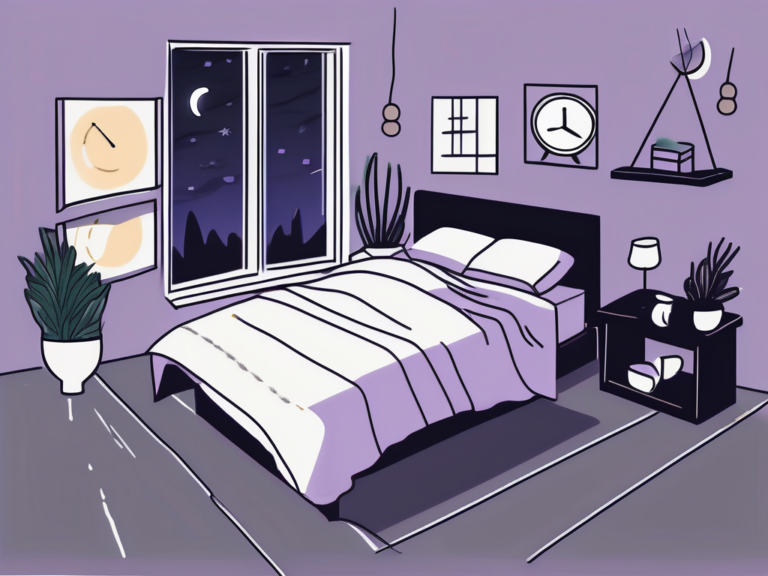Tips for Babies Who Fight Sleep: A Guide to Help Your Little One Rest
Babies fighting sleep can be a challenging situation for both parents and the little ones themselves. As a parent, it’s natural to wonder why your baby resists sleep and how you can help them find the rest they need. In this comprehensive guide, we will delve into the science behind babies’ sleep patterns, explore common reasons for sleep resistance, recognize signs of sleep resistance, provide practical tips to help your baby sleep, discuss special sleep challenges, and advise on when to seek professional help.
Understanding Why Babies Fight Sleep
The Science Behind Babies’ Sleep Patterns
Understanding the science behind babies’ sleep patterns can shed light on why some babies fight sleep more than others. A newborn’s sleep cycles are different from those of adults. They have shorter sleep cycles and spend more time in rapid eye movement (REM) sleep, which may explain why babies wake up more easily.
But did you know that the sleep patterns of babies also change as they grow? As infants transition from the newborn stage to the infant stage, their sleep cycles gradually become more similar to those of adults. This means that they spend less time in REM sleep and more time in deep sleep, allowing for longer periods of uninterrupted sleep.
Common Reasons for Sleep Resistance in Babies
Babies may fight sleep for various reasons. One common cause is overtiredness. When babies become overtired, they have difficulty falling asleep and staying asleep. Other factors that contribute to sleep resistance include discomfort, hunger, and overstimulation. By identifying the reasons behind sleep resistance, you can address the specific issues your baby may be facing.
It’s important to note that every baby is unique, and what works for one may not work for another. Some babies may have a harder time settling down for sleep due to their temperament. For example, highly sensitive babies may be more easily overstimulated and find it challenging to wind down at bedtime. On the other hand, some babies may simply have a more independent nature and prefer to explore their surroundings rather than sleep.
Additionally, external factors such as the environment can also play a role in sleep resistance. For instance, a baby who is too warm or too cold may have difficulty getting comfortable and falling asleep. Similarly, a noisy or brightly lit room can make it harder for a baby to relax and drift off into dreamland.
Recognizing Signs of Sleep Resistance
Physical Signs Your Baby is Fighting Sleep
Recognizing the physical signs your baby displays when fighting sleep can help you intervene early. Physical signs may include rubbing eyes, yawning, and fussiness. Paying attention to these cues can help you respond proactively and provide a soothing environment for your baby to sleep.
When your baby is fighting sleep, you may also notice other physical signs that indicate their resistance. These signs can include restlessness, increased body movements, and a flushed complexion. Restlessness may manifest as your baby tossing and turning, unable to find a comfortable position. Increased body movements can range from kicking their legs to flailing their arms. Additionally, a flushed complexion may indicate that your baby is becoming overtired and struggling to relax.
Behavioral Indicators of Sleep Resistance
Behavioral indicators of sleep resistance can vary from baby to baby. Some babies become hyperactive or fussy, while others may appear calm but refuse to settle down. By observing your baby’s behavior, you can gain insights into their sleep resistance patterns and tailor your approach accordingly.
Aside from hyperactivity and fussiness, there are other behavioral indicators that may suggest your baby is resisting sleep. These can include increased clinginess, seeking constant attention, and becoming easily distracted. Your baby may become more clingy, wanting to be held or comforted constantly, as a way to delay sleep. They may also seek constant attention, wanting to engage in play or interact with you instead of settling down. Furthermore, your baby may become easily distracted by their surroundings, finding it difficult to focus on winding down for sleep.
Practical Tips to Help Your Baby Sleep
Creating a Consistent Sleep Routine
Establishing a consistent sleep routine can work wonders for your baby’s sleep patterns. Implementing a familiar sequence of activities before bedtime signals to your little one that it’s time to wind down. Consider activities such as a warm bath, bedtime story, or gentle lullabies to create a soothing atmosphere that promotes relaxation. Remember, consistency is key.
The Role of a Comfortable Sleep Environment
A comfortable sleep environment plays a vital role in helping babies settle down for sleep. Ensure the room is dark, cool, and quiet. Consider using white noise machines or soft music to create a calm ambiance. Additionally, providing a cozy sleep surface and using age-appropriate sleepwear can contribute to your baby’s comfort and enhance their sleep quality.
Nutritional Factors Affecting Baby’s Sleep
Proper nutrition can significantly impact your baby’s sleep patterns. Discuss with your pediatrician about age-appropriate feeding schedules and strategies. Offering a balanced and satisfying meal before bedtime can help avoid hunger-induced sleep resistance. However, be cautious not to overfeed, as this may lead to discomfort and disrupt sleep.
Aside from nutrition, it’s important to consider the impact of hydration on your baby’s sleep. Keeping your little one well-hydrated throughout the day can help prevent nighttime awakenings due to thirst. Consider offering small sips of water during the day, especially during warmer weather or if your baby is more active than usual.
Another factor to consider is the influence of physical activity on your baby’s sleep. Engaging in age-appropriate play and movement during the day can help tire your baby out, making it easier for them to fall asleep and stay asleep. Encourage active playtime and provide opportunities for your baby to explore their surroundings, both indoors and outdoors.
Dealing with Special Sleep Challenges
Overcoming Night Terrors and Nightmares
Night terrors and nightmares can disrupt your baby’s sleep and cause distress. While night terrors are more common in toddlers, nightmares can affect babies too. Offering comfort, reassurance, and a consistent bedtime routine can help alleviate the impact of these disturbances. If the issues persist, consult your pediatrician for further guidance.
Handling Sleep Regression in Babies
Sleep regression is a temporary disruption in a baby’s sleep routine that typically occurs around specific developmental milestones. It can manifest as increased night waking or difficulty falling asleep. Understanding that sleep regressions are temporary and implementing strategies such as maintaining consistency and comfort can help your little one navigate through these periods more smoothly.
When it comes to night terrors, it is important to remember that they are different from nightmares. Night terrors are episodes of intense fear and screaming that occur during sleep, usually within the first few hours after falling asleep. They can be quite alarming for parents to witness, as their baby may appear to be awake but is actually still asleep. Nightmares, on the other hand, are bad dreams that can cause your baby to wake up feeling scared or upset.
During a night terror, your baby may seem inconsolable and may not recognize you or respond to your attempts to comfort them. It is best to simply stay nearby and ensure their safety until the episode passes. Night terrors usually last for a few minutes, and your baby will likely go back to sleep without fully waking up. Remember, night terrors are a normal part of development and most children outgrow them by the age of 5.
As for sleep regression, it can be a challenging time for both babies and parents. It often occurs when your baby is going through a growth spurt or learning new skills, such as crawling or walking. These milestones can disrupt their sleep patterns and cause them to wake up more frequently during the night. While it may be tempting to introduce new sleep habits or routines during this time, it is important to stick to your baby’s established bedtime routine and provide them with a familiar and comforting environment.
During sleep regression, your baby may also experience increased fussiness and clinginess during the day. This is normal and a result of their disrupted sleep patterns. It is important to be patient and understanding during this time, offering extra comfort and reassurance to help them feel secure. Remember, sleep regressions are temporary and with time, your baby’s sleep patterns will return to normal.
When to Seek Professional Help
Identifying Serious Sleep Disorders in Babies
While sleep resistance is typically a common occurrence in babies, it’s essential to be aware of signs pointing to the possibility of a more serious sleep disorder. Excessive daytime sleepiness, irregular breathing, and extreme difficulty sleeping for extended periods might indicate an underlying issue. Consult your pediatrician if you suspect a sleep disorder.
Consulting a Pediatrician for Sleep Issues
If your baby’s sleep resistance persists despite implementing various strategies or if you feel overwhelmed, reaching out to a pediatrician is always a good idea. They can provide tailored advice, evaluate potential health concerns, and guide you through customized solutions for your baby’s sleep challenges.
It is important to remember that sleep disorders in babies can be caused by a variety of factors. One such factor is sleep apnea, a condition characterized by pauses in breathing during sleep. Sleep apnea can lead to disrupted sleep patterns and affect your baby’s overall well-being. If you notice any irregularities in your baby’s breathing, such as loud snoring or gasping for air, it is crucial to seek professional help promptly.
Another sleep disorder that may affect babies is narcolepsy. Although it is more commonly associated with adults, narcolepsy can also occur in infants. Symptoms of narcolepsy in babies include sudden and uncontrollable episodes of sleep during the day, even after a full night’s rest. If you observe these symptoms in your baby, it is advisable to consult a pediatrician for further evaluation and guidance.
By understanding the reasons behind sleep resistance, recognizing the signs of potential sleep disorders, incorporating practical tips into your routine, and seeking professional help when necessary, you can help your baby move towards a more restful sleep pattern. Remember, every baby is unique, and finding the strategies that work for your little one may require some trial and error. With patience, consistency, and a loving approach, you can support your baby’s journey to a peaceful slumber.






